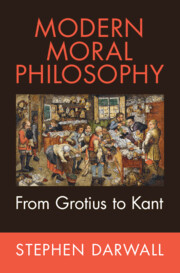Book contents
- Modern Moral Philosophy
- Modern Moral Philosophy
- Copyright page
- Dedication
- Contents
- Preface
- Acknowledgments
- Introduction
- 1 Grotius
- 2 Hobbes and Pufendorf
- 3 Locke and Cumberland
- 4 Spinoza, Cudworth, Shaftesbury, and Leibniz
- 5 Hutcheson and Butler
- 6 Hume and Smith
- 7 The British Rationalists and Reid
- 8 Rousseau and Kant
- Works Cited
- Index
3 - Locke and Cumberland
Published online by Cambridge University Press: 10 June 2023
- Modern Moral Philosophy
- Modern Moral Philosophy
- Copyright page
- Dedication
- Contents
- Preface
- Acknowledgments
- Introduction
- 1 Grotius
- 2 Hobbes and Pufendorf
- 3 Locke and Cumberland
- 4 Spinoza, Cudworth, Shaftesbury, and Leibniz
- 5 Hutcheson and Butler
- 6 Hume and Smith
- 7 The British Rationalists and Reid
- 8 Rousseau and Kant
- Works Cited
- Index
Summary
Grotius, Hobbes, and Pufendorf are canonical representatives of the early modern natural law tradition. In this chapter, we consider the tradition’s other two main figures: John Locke and Richard Cumberland. Locke is justly famous, of course, though more for his political philosophy and the more familiar topics in epistemology and metaphysics treated in the Essay Concerning Human Understanding than for his ethics. In his moral philosophy, however, he makes interesting connections between moral accountability and autonomy that provide an interesting point of contrast with Pufendorf. Cumberland is much less well known. However, Cumberland’s contemporaries saw him, along with Grotius and Pufendorf, as one of a “triumvirate of seventeenth-century founders of the ‘modern’ school of natural law” (Haakonssen). Moreover, Cumberland has special relevance to moral philosophy of the present day, since he was among the first to attempt to “locate” moral truths and facts in relation to, and perhaps reduce them to, those that are confirmable by the empirical sciences, a naturalist program that remains vital today. And he was also an important source of philosophical utilitarianism.
- Type
- Chapter
- Information
- Modern Moral PhilosophyFrom Grotius to Kant, pp. 87 - 110Publisher: Cambridge University PressPrint publication year: 2023



